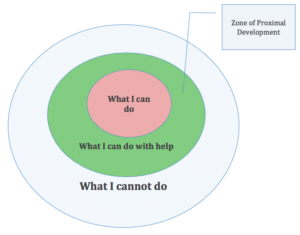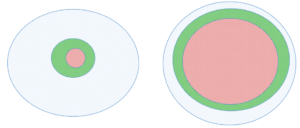-
Musical Agency and the Zone of Proximal Development
For students, musical agency means having a stake in the learning process; students have the capacity to believe they are in control of their own learning. We know that when children are able to connect learning to their own experience, they develop deeper understandings. Philosophically, agency can be described as a democratic classroom (Woodford) or an open system (Jorgensen) in which students have greater control over the learning process. Psychologically, there are also theories which promote musical agency, one being, the Zone of Proximal Development (ZPD)

ZPD is the area between what students can and cannot do. Aligning students in this zone, allows for growth and musical agency. The challenge within my classroom and I suspect many other art classrooms, is the wide spectrum of learning capabilities. Unlike a math class or an English class, students are placed in an arts class based on their schedule or status of their credit fulfillments. Due to the lack of selectivity, the class tends to be larger than most. Therefore, negotiating the ZPD becomes challenging as the ‘zone’ changes more drastically between each students. Above is the ideal ZPD, however in reality, the ZPD may look more like the ones seen below.

Based on a curriculum with limited modifications, a student may find them selves on either of these charts. It is certainly my job as the teacher to offer modifications for both cases in order to promote the appropriate portions within the learning experience, however it is nothing short of a challenge in a large classroom with limited resources. But perhaps by beginning with the shared musical experiences of students and building outward from there, I can better negotiate the appropriate path for student learning.
